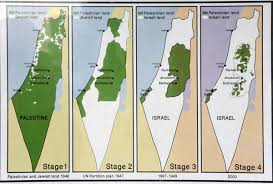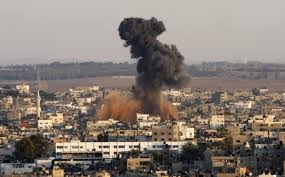This current round of battling in our South has been depressing in the fact that it had to happen. There has not been any political way of getting the Hamas terrorists to stop firing explosives at our civilians. This tragically has been the history of life in Israel since the Jewish people returned to our ancestral homeland in 1948. Many of my friends and neighbors have fought in several wars. Many of them spent their early childhoods sleeping in bomb shelters. Our only real crime is that we have returned to our homeland that began in the days of Abraham and Sarah.
The United Nations Partition Plan for Palestine was a resolution adopted on 29 November 1947 by the General Assembly of the United Nations. Its title was United Nations General Assembly Resolution 181 (II) Future Government of Palestine. The resolution was passed while the British still controlled Palestine. It was neither a Jewish homeland nor a Palestinian state at the time. The British Mandate for Palestine, or simply the Mandate for Palestine, was a legal commission for the administration of the territory that had formerly constituted part of the Ottoman Empire. The draft of the Mandate was formally confirmed by the Council of the League of Nations on 24 July 1922. The mandate ended at midnight on 14 May 1948.

The resolution recommended the termination of the British Mandate for Palestine and the partition of the territory into two states, one Jewish and one Arab, with the Jerusalem-Bethlehem area being under special international protection, administered by the United Nations.
However, war broke out and the partition plan was never implemented by the Security Council. The UN blamed the Arabs for the violence. The UN Palestine Commission was never permitted by the Arabs or British to go to Palestine to implement the resolution. On February 16, 1948, the Commission reported to the Security Council:
"Powerful Arab interests, both inside and outside Palestine, are defying the resolution of the General Assembly and are engaged in a deliberate effort to alter by force the settlement envisaged therein."
The Arabs were blunt in taking responsibility for starting the war. Jamal Husseini told the Security Council on April 16, 1948:
"The representative of the Jewish Agency told us yesterday that they were not the attackers, that the Arabs had begun the fighting. We did not deny this. We told the whole world that we were going to fight."
The proposed plan was accepted by the leaders of the Jewish community in Palestine and many local Christians, Muslims, and Druze. However, the plan was rejected by leaders of the Arab community (the Palestine Arab Higher Committee etc.) who were supported in their rejection by the states of the Arab League. In a communication to the United Nations Palestine Commission dated 19 January 1948, the Arab Higher Committee for Palestine stated that it was "determined [to] persist in rejection [to the] partition and in refusal [to] recognize UN resolution [with] this respect and anything deriving. The Jews accepted partition into a gerrymandered crazy quilt and even accepted the internationalization of Jerusalem. This diminished and indefensible territory was to be the dreamed-of Jewish homeland and the haven for the pitiful remnants of Nazi Holocaust survivors.
The Arab League attacked the new Jewish and Palestinian homelands in 1948 prompting thousands of Jews, Christians, and Muslims to flee their homes. The invading Arab nations captured and confiscated the Palestinian homeland until the 1967 war. The city of Jerusalem was controlled by Jordan. Access of Jews to all holy sites was refused in spite of United Nations resolutions to the contrary.
Today, sixty four years later, Jordan and Egypt are our only neighbors that recognize our right to exist. Israel, still respects the right of the Palestinians to their own homeland. They now control much of the territory granted to them by The United Nations Partition Plan for Palestine. Twenty per cent of the citizens of pre-1967 Israel are Muslims and Christians who live in the only true democracy in this region. Many if not most Jews, Christians, Druze, and Muslims on both sides of our borders hope to live in peace and with dignity.
I am convinced as are many Israelis that Hamas does not represent the true nature of our Palestinian friends and neighbors. Many Israelis and Palestinians hope for the day that the fighting will end and that we can be an example to the rest of the world that nations can live together in peace.
Hopefully by the time it ends there will be some important changes in the "rules of the game" here, so that the people who have been enduring such rocket fire will be able to live normal lives. The missile attacks have spread from the south to much of Israel including Tel Aviv and Jerusalem. Jerusalem is holy to both Judaism, Christianity, and Islam.

If a ground invasion of Gaza could be avoided that would seem much cleaner and less distasteful. However, no one knows which way this engagement will turn, and we are bracing ourselves for the worst yet still hoping for the best. We are all saddened by the deaths and injuries of everyone on both sides of this battle. It is a shame that the assassination of the Gaza Chief of Military staff became necessary. He had the blood of Israeli men, women, and children on his hands. He believed in terrorism and mass murder. He called for the destruction of our nation.
Defeat in this region is not an option for us Jews, even though clear-cut winning/victory is also often not an option. The greatest hope is for a political settlement. Peace treaties will surely involve compromise. Settling the feuds will feel like a victory of sorts for all sides, and peace will allow our children and grandchildren and their grandchildren to live without fear of being bombed. They will attend their schools safely, without the need for air raid sirens and bomb shelters.
Until that day, We in Israel do not despair of the situation, and make the best of what has been, until now, a satisfying and fulfilling life within the shadow and pain of the constant state of military engagement with many enemies on many fronts.
The United Nations Partition Plan for Palestine was a resolution adopted on 29 November 1947 by the General Assembly of the United Nations. Its title was United Nations General Assembly Resolution 181 (II) Future Government of Palestine. The resolution was passed while the British still controlled Palestine. It was neither a Jewish homeland nor a Palestinian state at the time. The British Mandate for Palestine, or simply the Mandate for Palestine, was a legal commission for the administration of the territory that had formerly constituted part of the Ottoman Empire. The draft of the Mandate was formally confirmed by the Council of the League of Nations on 24 July 1922. The mandate ended at midnight on 14 May 1948.
The resolution recommended the termination of the British Mandate for Palestine and the partition of the territory into two states, one Jewish and one Arab, with the Jerusalem-Bethlehem area being under special international protection, administered by the United Nations.
However, war broke out and the partition plan was never implemented by the Security Council. The UN blamed the Arabs for the violence. The UN Palestine Commission was never permitted by the Arabs or British to go to Palestine to implement the resolution. On February 16, 1948, the Commission reported to the Security Council:
"Powerful Arab interests, both inside and outside Palestine, are defying the resolution of the General Assembly and are engaged in a deliberate effort to alter by force the settlement envisaged therein."
The Arabs were blunt in taking responsibility for starting the war. Jamal Husseini told the Security Council on April 16, 1948:
"The representative of the Jewish Agency told us yesterday that they were not the attackers, that the Arabs had begun the fighting. We did not deny this. We told the whole world that we were going to fight."
The proposed plan was accepted by the leaders of the Jewish community in Palestine and many local Christians, Muslims, and Druze. However, the plan was rejected by leaders of the Arab community (the Palestine Arab Higher Committee etc.) who were supported in their rejection by the states of the Arab League. In a communication to the United Nations Palestine Commission dated 19 January 1948, the Arab Higher Committee for Palestine stated that it was "determined [to] persist in rejection [to the] partition and in refusal [to] recognize UN resolution [with] this respect and anything deriving. The Jews accepted partition into a gerrymandered crazy quilt and even accepted the internationalization of Jerusalem. This diminished and indefensible territory was to be the dreamed-of Jewish homeland and the haven for the pitiful remnants of Nazi Holocaust survivors.
The Arab League attacked the new Jewish and Palestinian homelands in 1948 prompting thousands of Jews, Christians, and Muslims to flee their homes. The invading Arab nations captured and confiscated the Palestinian homeland until the 1967 war. The city of Jerusalem was controlled by Jordan. Access of Jews to all holy sites was refused in spite of United Nations resolutions to the contrary.
Today, sixty four years later, Jordan and Egypt are our only neighbors that recognize our right to exist. Israel, still respects the right of the Palestinians to their own homeland. They now control much of the territory granted to them by The United Nations Partition Plan for Palestine. Twenty per cent of the citizens of pre-1967 Israel are Muslims and Christians who live in the only true democracy in this region. Many if not most Jews, Christians, Druze, and Muslims on both sides of our borders hope to live in peace and with dignity.
I am convinced as are many Israelis that Hamas does not represent the true nature of our Palestinian friends and neighbors. Many Israelis and Palestinians hope for the day that the fighting will end and that we can be an example to the rest of the world that nations can live together in peace.
No comments:
Post a Comment